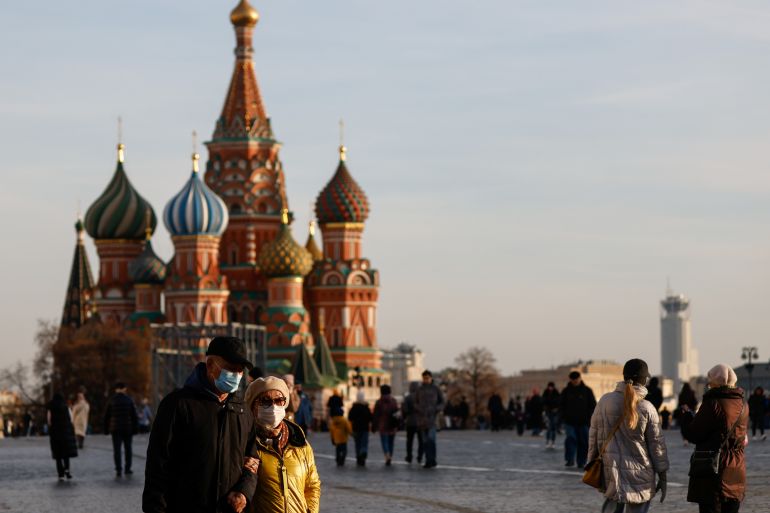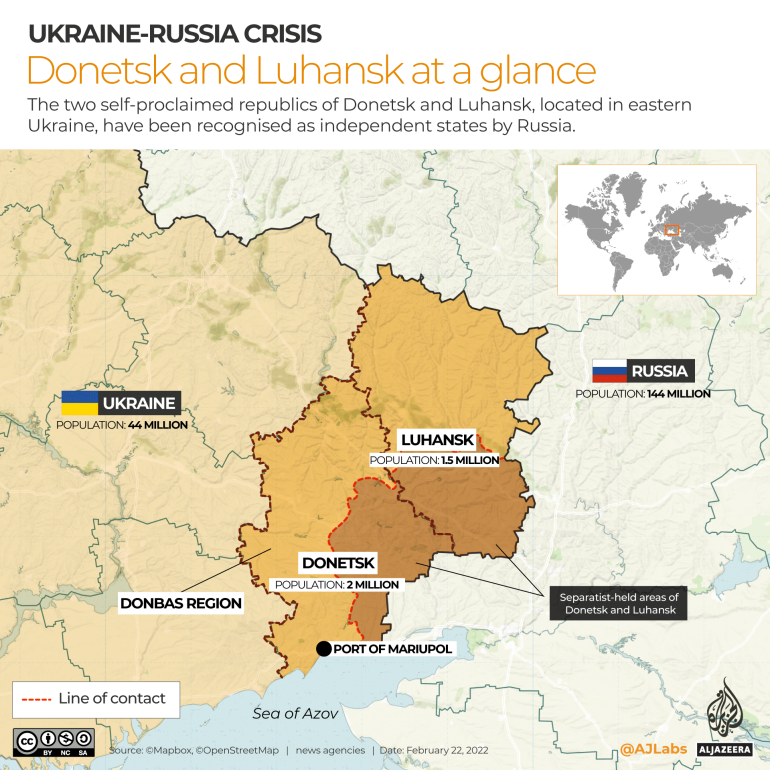Russians bemoan Putin’s decision to recognise ‘republics’
While government-friendly media celebrate, many outside the corridors of power are critical of their president’s latest move.

Saint Petersburg, Russia – On Monday, Russian President Vladimir Putin signed a decree to officially recognise the breakaway, self-proclaimed Donetsk and Luhansk People’s Republics (DPR and LPR, respectively) in war-torn eastern Ukraine.
The move has sent fears through much of Europe that this will give Russia a reason to launch a wider military campaign on Ukrainian territory, perhaps sparking open war.
Keep reading
list of 4 itemsCentral Europe braces for an influx of Ukrainian refugees
Is war more likely after Russia recognised rebel statelets?
Russia-Ukraine crisis: 5 things to know about Putin’s bold move
While those fears surged in Western nations, in Russia, pro-Putin figures celebrated.
Press and commentators friendly to the government praised the decree, with Margarita Simonyan, the editor-in-chief of Russian state-owned news network RT and longtime advocate for the recognition of the people’s republics, known collectively as Donbas, calling it an “overdue decision”.
“Happy birthday, Donbas!” she proclaimed on her Telegram channel.
“Happiness lies not in euros, lads!” Olga Skabeeva, host of the Russia 1 TV channel wrote on her Telegram as the price of the rouble fell against the euro. “Long live the Russian world and Russian people!”

War correspondent Alexander Kots, of the Komsomolskaya Pravda tabloid, and Semyon Pegov’s WarGonzo YouTube channel posted footage from Donbas where locals shot fireworks and waved Russian flags in celebration, expressing the hope that Russia’s recognition would finally mean the threat of bloody conflict, which had been looming over their heads for eight years, was drawing to a close.
“Recognition does not unleash a war, but ends these rather hellish eight years, and everyone should be happy,” journalist Oleg Kashin wrote on Telegram. “There is no particular reason to consider Putin a grandfather who has gone [insane].”
Some ordinary Russians were behind their government, including 60-year-old Artur from Saint Petersburg, who declined to give his full name.
“Recognising was the right step, but it should have been taken yesterday, or even better in 2014,” he told Al Jazeera. “The [Ukrainians] delayed the [peace] settlement for eight years and now they see the logical conclusion of their actions. Russia was threatened with new sanctions anyway so they took the right move in this situation.”
“I think it was the right decision,” added Nikolai Sergeevich, 32, a businessman from Mordovia.
“We might suffer a little economically, but the people there will finally get some peace and quiet and they will be able to trade, at least with the countries that recognise them. I think Ukraine should withdraw its troops and take a seat at the negotiating table. They’ve already been bombing Donetsk for seven years already, it’s about time this all stopped.”
But most people approached by Al Jazeera, regardless of their views, were afraid to talk on the record. They expressed a sense of uncertainty and powerlessness about what could happen next, either way.
State-friendly media have been assuring their audiences that open warfare will not erupt. Even among those opposed to Putin’s government, the idea of an all-out war with a neighbouring nation – in which many have friends and relatives – was still unthinkable days ago.
Now, the prospect of war feels closer.
“What is happening is a tragedy that creates the deepest chasm between our two brotherly peoples,” 80-year-old Lyudmila Basok, from Saint Petersburg, told Al Jazeera.
“The situation is terrible; I feel sorry for the people who have become hostages of Putin’s policy and his imperial ambitions,” said business owner Artem, 41, from St Petersburg, who preferred not to give his full name.
“Russia is obliged to leave the Donbas and Ukraine alone. But, unfortunately, this is only possible without Putin. As long as he’s alive, that’s unlikely to happen.”
Alexey Krapukhin, a member of the liberal party Yabloko’s regional council in Moscow, told Al Jazeera: “Yesterday’s decision by Putin to recognise the LNR and DPR has put Russia on the path to social, financial and political catastrophe.”
Putin’s announcement caused the rouble to plunge and sent jitters through the markets.
“Already we can see the markets falling. Every Russian will feel the consequences of this decision. Never before has [modern] Russia been so close to an all-out war. Nobody knows where Russian troops will stay on the frontline, or push further into Donetsk,” Krapukhin said.
“Unfortunately there are still many Russians who believe what they see on TV and praise the decisions of Putin, but they will feel it, too, if one of their relatives will be sent to war. But in Russia there is still a substantial portion of us who do not support this war because it reminds us of the occupation of Poland and the Baltics which we saw in the most terrifying years of the 20th century.”
On Facebook, Krapukhin and others opposed to the recognition marked their profile photos with a Ukrainian flag.
Russia’s decision marks a significant shift from its usual policy. Before, like all other United Nations members, Russia had refused to recognise the “republics”. Even in recent weeks, it said such a move would be too provocative.
But as tensions between Moscow and the West rose further, President Putin, increasingly frustrated by Washington and NATO, signed the decree.
Russia has demanded that NATO never allow Ukraine to become a member and has massed more than 150,000 troops near its former-Soviet neighbour, fuelling war fears. Putin and his officials deny they are planning an invasion, claiming that they have the right to place their soldiers and military equipment where they please, as an act of self-defence within their country’s borders.
Meanwhile across social media, the hashtag #янемолчу (“I’m not silent”) was trending. The campaign was started by Taisia Bekbulatova, editor-in-chief of the online magazine Kholod.
“Lately, it feels like we’ve all fallen into collective sleep paralysis. This is when something unbearably terrible stands in front of you, but you can neither move nor scream,” she wrote on her Facebook and Instagram pages.
“Many feel horror and impotence because of what is happening with Ukraine, and they seem to hope that if they ignore the situation, it will blow over. But what is happening in the last days can no longer be ignored. Many people say that they wake up every day wondering if the war has begun. It’s a kind of insanity.”
The hashtag was picked up by others.
“Many people close to me are terrified of the prospect of the war with Ukraine, and I am worried about them,” lawyer and activist Nikolai Kavkazsky wrote under the hashtag. “War will be a disaster for all of us. We do not need it and it is being artificially imposed on the Kremlin.”
While protest action had been limited to a handful of pickets, dissent has risen over the past week.
On Saturday, the famous Russian poet Yuliy Kim posted a poem to his Facebook page.
“I am not at war with Ukraine,” he wrote, “So that the wind dispels the black smoke, and so that it only blackens those who started all this – an eternal stigma of shame!”
On Sunday, a group of six protesters unfurled banners reading “Russia, don’t touch Ukraine!” in Moscow, only to be immediately taken away by police.